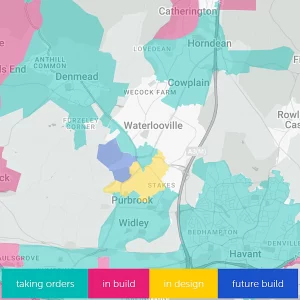Sponsored Links
Network Capacity Fears Could Hamper Mobile Broadband
Posted: 26th Aug, 2008 By: MarkJ
Simon Bransfield-Garth, an analytics expert on the mobile industry for CarrierIQ, has warned that Mobile Broadband services could run out of capacity if demand continues to grow at its current rate.
T-Mobile reported earlier this year that data traffic on its UK network had already exceeded that of voice for the first time, with Three (3) and Vodafone being expected to announce a similar situation before the end of 2008:
Capacity issues have cropped up before, though they've been largely brushed aside and several mobile operators, especially Vodafone, have also been investing a lot of money into their platforms.
Analysys Mason's Matt Hatton echos Bransfield-Garth's comments, warning that operators will need to go even further than Vodafone if they wish to survive in a market where their chief competition is from more flexible land-line ISPs:
Both appear to predict that existing investment should tide most of the operators over for the next three to five years, although after that the future looks less certain. It's feared that mobile operators are failing to look far enough ahead and don't yet quite understand the market they're moving into.
Stop us if any of this sounds familiar because it is, we saw an almost identical situation with early land-line broadband services too, although they had more room to breathe. Like it or not, mobile operators have stepped on a new product that people really want and theyll need to manage that or risk breaking it. More @ The Register.
T-Mobile reported earlier this year that data traffic on its UK network had already exceeded that of voice for the first time, with Three (3) and Vodafone being expected to announce a similar situation before the end of 2008:
"Their pricing plans make no sense to me. I think the carriers have little, or no idea of what people do with mobile broadband. Contention will definitely become an issue," Bransfield-Garth warned.
"Already, phone users will be familiar with the 'network busy' sign when they try to place a call at rush hour. What we need to know is whether it really is better for the MNOs to keep one BBC iPlayer viewer going, and to prevent 40 phone calls going through."
"Already, phone users will be familiar with the 'network busy' sign when they try to place a call at rush hour. What we need to know is whether it really is better for the MNOs to keep one BBC iPlayer viewer going, and to prevent 40 phone calls going through."
Capacity issues have cropped up before, though they've been largely brushed aside and several mobile operators, especially Vodafone, have also been investing a lot of money into their platforms.
Analysys Mason's Matt Hatton echos Bransfield-Garth's comments, warning that operators will need to go even further than Vodafone if they wish to survive in a market where their chief competition is from more flexible land-line ISPs:
"Mobile Network Operators need to review their requirements for network capacity immediately in response to this rapid change in traffic composition," he wrote. "They will need to invest further in their RANs as well as the ongoing upgrade to HSPA. The demand for additional network capacity from reallocation of GSM spectrum, the 2.6GHz expansion band and the digital dividend spectrum will be substantial."
Both appear to predict that existing investment should tide most of the operators over for the next three to five years, although after that the future looks less certain. It's feared that mobile operators are failing to look far enough ahead and don't yet quite understand the market they're moving into.
Stop us if any of this sounds familiar because it is, we saw an almost identical situation with early land-line broadband services too, although they had more room to breathe. Like it or not, mobile operators have stepped on a new product that people really want and theyll need to manage that or risk breaking it. More @ The Register.
Search ISP News
Search ISP Listings
Search ISP Reviews
Latest UK ISP News








Cheap BIG ISPs for 100Mbps+
150,000+ Customers | View More ISPs
Cheapest ISPs for 100Mbps+
Modest Availability | View More ISPs
Latest UK ISP News
Helpful ISP Guides and Tips
Sponsored Links
The Top 15 Category Tags
- FTTP (6798)
- BT (3881)
- Politics (3074)
- Business (2766)
- Openreach (2663)
- Building Digital UK (2512)
- Mobile Broadband (2475)
- FTTC (2142)
- Statistics (2127)
- 4G (2092)
- Virgin Media (2024)
- Ofcom Regulation (1779)
- 5G (1732)
- Fibre Optic (1604)
- Wireless Internet (1595)
Sponsored
Copyright © 1999 to Present - ISPreview.co.uk - All Rights Reserved - Terms , Privacy and Cookie Policy , Links , Website Rules































